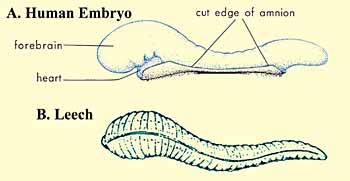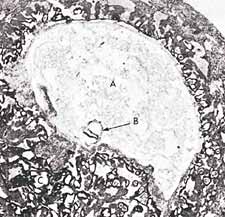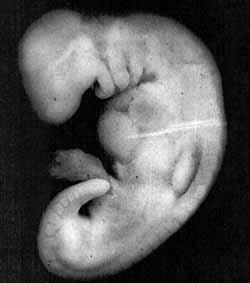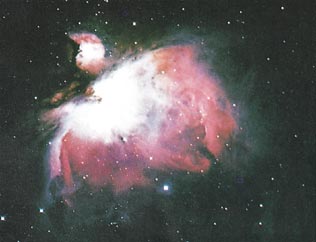Jabar
“Strive always to excel in virtue and truth.”
@Taylor Seraphim Complete proof through science that Islam is truth and it could never have been copied:
In the Holy Quran, God speaks about the stages of man’s embryonic development:
 We created man from an extract of clay. Then We made him as a drop in a place of settlement, firmly fixed. Then We made the drop into an alaqah (leech, suspended thing, and blood clot), then We made the alaqahinto a mudghah (chewed substance)...
We created man from an extract of clay. Then We made him as a drop in a place of settlement, firmly fixed. Then We made the drop into an alaqah (leech, suspended thing, and blood clot), then We made the alaqahinto a mudghah (chewed substance)...
 1(Quran, 23:12-14)
1(Quran, 23:12-14)
Literally, the Arabic word alaqah has three meanings: (1) leech, (2) suspended thing, and (3) blood clot.
In comparing a leech to an embryo in the alaqah stage, we find similarity between the two2 as we can see in figure 1. Also, the embryo at this stage obtains nourishment from the blood of the mother, similar to the leech, which feeds on the blood of others.3

Figure 1: Drawings illustrating the similarities in appearance between a leech and a human embryo at thealaqah stage. (Leech drawing from Human Development as Described in the Quran and Sunnah, Moore and others, p. 37, modified from Integrated Principles of Zoology, Hickman and others. Embryo drawing from The Developing Human, Moore and Persaud, 5th ed., p. 73.)
The second meaning of the word alaqah is “suspended thing.” This is what we can see in figures 2 and 3, the suspension of the embryo, during the alaqah stage, in the womb of the mother.
Figure 2: We can see in this diagram the suspension of an embryo during the alaqah stage in the womb (uterus) of the mother. (The Developing Human, Moore and Persaud, 5th ed., p. 66.) (Click on the image to enlarge it.)

Figure 3: In this photomicrograph, we can see the suspension of an embryo (marked B) during the alaqah stage (about 15 days old) in the womb of the mother. The actual size of the embryo is about 0.6 mm. (The Developing Human, Moore, 3rd ed., p. 66, from Histology, Leeson and Leeson.)

The third meaning of the word alaqah is “blood clot.” We find that the external appearance of the embryo and its sacs during the alaqah stage is similar to that of a blood clot. This is due to the presence of relatively large amounts of blood present in the embryo during this stage4 (see figure 4). Also during this stage, the blood in the embryo does not circulate until the end of the third week.5 Thus, the embryo at this stage is like a clot of blood.
Figure 4: Diagram of the primitive cardiovascular system in an embryo during the alaqah stage. The external appearance of the embryo and its sacs is similar to that of a blood clot, due to the presence of relatively large amounts of blood present in the embryo. (The Developing Human, Moore, 5th ed., p. 65.) (Click on the image to enlarge it.)

So the three meanings of the word alaqah correspond accurately to the descriptions of the embryo at the alaqahstage.
The next stage mentioned in the verse is the mudghahstage. The Arabic word mudghah means “chewed substance.” If one were to take a piece of gum and chew it in his or her mouth and then compare it with an embryo at the mudghah stage, we would conclude that the embryo at the mudghah stage acquires the appearance of a chewed substance. This is because of the somites at the back of the embryo that “somewhat resemble teethmarks in a chewed substance.”6 (see figures 5 and 6).
Figure 5: Photograph of an embryo at themudghah stage (28 days old). The embryo at this stage acquires the appearance of a chewed substance, because the somites at the back of the embryo somewhat resemble teeth marks in a chewed substance. The actual size of the embryo is 4 mm. (The Developing Human, Moore and Persaud, 5th ed., p. 82, from Professor Hideo Nishimura, Kyoto University, Kyoto, Japan.)

Figure 6: When comparing the appearance of an embryo at themudghah stage with a piece of gum that has been chewed, we find similarity between the two.
A) Drawing of an embryo at the mudghah stage. We can see here the somites at the back of the embryo that look like teeth marks. (The Developing Human, Moore and Persaud, 5th ed., p. 79.)
B) Photograph of a piece of gum that has been chewed.
(Click on the image to enlarge it.)

How could Muhammad
 have possibly known all this 1400 years ago, when scientists have only recently discovered this using advanced equipment and powerful microscopes which did not exist at that time? Hamm and Leeuwenhoek were the first scientists to observe human sperm cells (spermatozoa) using an improved microscope in 1677 (more than 1000 years after Muhammad
have possibly known all this 1400 years ago, when scientists have only recently discovered this using advanced equipment and powerful microscopes which did not exist at that time? Hamm and Leeuwenhoek were the first scientists to observe human sperm cells (spermatozoa) using an improved microscope in 1677 (more than 1000 years after Muhammad
 ). They mistakenly thought that the sperm cell contained a miniature preformed human being that grew when it was deposited in the female genital tract.7
). They mistakenly thought that the sperm cell contained a miniature preformed human being that grew when it was deposited in the female genital tract.7

Figure 10: A new star forming out of a cloud of gas and dust (nebula), which is one of the remnants of the ‘smoke’ that was the origin of the whole universe. (The Space Atlas, Heather and Henbest, p. 50.)

View full at @ http://www.islam-guide.com/ch1-1-f.htm
In the Holy Quran, God speaks about the stages of man’s embryonic development:


Literally, the Arabic word alaqah has three meanings: (1) leech, (2) suspended thing, and (3) blood clot.
In comparing a leech to an embryo in the alaqah stage, we find similarity between the two2 as we can see in figure 1. Also, the embryo at this stage obtains nourishment from the blood of the mother, similar to the leech, which feeds on the blood of others.3

Figure 1: Drawings illustrating the similarities in appearance between a leech and a human embryo at thealaqah stage. (Leech drawing from Human Development as Described in the Quran and Sunnah, Moore and others, p. 37, modified from Integrated Principles of Zoology, Hickman and others. Embryo drawing from The Developing Human, Moore and Persaud, 5th ed., p. 73.)
The second meaning of the word alaqah is “suspended thing.” This is what we can see in figures 2 and 3, the suspension of the embryo, during the alaqah stage, in the womb of the mother.
Figure 2: We can see in this diagram the suspension of an embryo during the alaqah stage in the womb (uterus) of the mother. (The Developing Human, Moore and Persaud, 5th ed., p. 66.) (Click on the image to enlarge it.)

Figure 3: In this photomicrograph, we can see the suspension of an embryo (marked B) during the alaqah stage (about 15 days old) in the womb of the mother. The actual size of the embryo is about 0.6 mm. (The Developing Human, Moore, 3rd ed., p. 66, from Histology, Leeson and Leeson.)

The third meaning of the word alaqah is “blood clot.” We find that the external appearance of the embryo and its sacs during the alaqah stage is similar to that of a blood clot. This is due to the presence of relatively large amounts of blood present in the embryo during this stage4 (see figure 4). Also during this stage, the blood in the embryo does not circulate until the end of the third week.5 Thus, the embryo at this stage is like a clot of blood.
Figure 4: Diagram of the primitive cardiovascular system in an embryo during the alaqah stage. The external appearance of the embryo and its sacs is similar to that of a blood clot, due to the presence of relatively large amounts of blood present in the embryo. (The Developing Human, Moore, 5th ed., p. 65.) (Click on the image to enlarge it.)

So the three meanings of the word alaqah correspond accurately to the descriptions of the embryo at the alaqahstage.
The next stage mentioned in the verse is the mudghahstage. The Arabic word mudghah means “chewed substance.” If one were to take a piece of gum and chew it in his or her mouth and then compare it with an embryo at the mudghah stage, we would conclude that the embryo at the mudghah stage acquires the appearance of a chewed substance. This is because of the somites at the back of the embryo that “somewhat resemble teethmarks in a chewed substance.”6 (see figures 5 and 6).
Figure 5: Photograph of an embryo at themudghah stage (28 days old). The embryo at this stage acquires the appearance of a chewed substance, because the somites at the back of the embryo somewhat resemble teeth marks in a chewed substance. The actual size of the embryo is 4 mm. (The Developing Human, Moore and Persaud, 5th ed., p. 82, from Professor Hideo Nishimura, Kyoto University, Kyoto, Japan.)

Figure 6: When comparing the appearance of an embryo at themudghah stage with a piece of gum that has been chewed, we find similarity between the two.
A) Drawing of an embryo at the mudghah stage. We can see here the somites at the back of the embryo that look like teeth marks. (The Developing Human, Moore and Persaud, 5th ed., p. 79.)
B) Photograph of a piece of gum that has been chewed.
(Click on the image to enlarge it.)

How could Muhammad



Figure 10: A new star forming out of a cloud of gas and dust (nebula), which is one of the remnants of the ‘smoke’ that was the origin of the whole universe. (The Space Atlas, Heather and Henbest, p. 50.)

View full at @ http://www.islam-guide.com/ch1-1-f.htm

